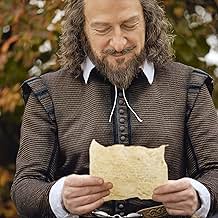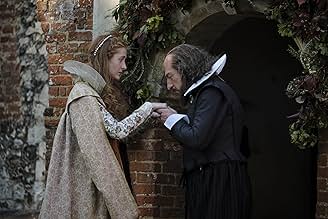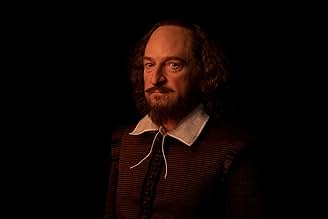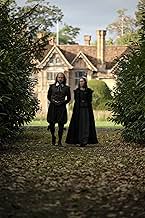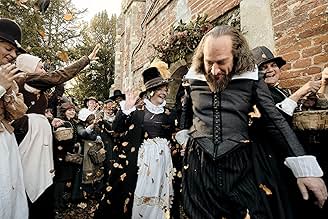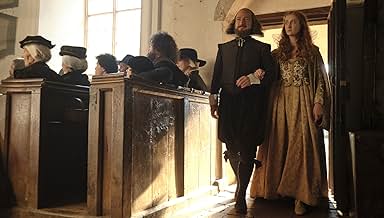NOTE IMDb
6,3/10
5,8 k
MA NOTE
On examine les derniers jours de la vie de l'écrivain renommé William Shakespeare.On examine les derniers jours de la vie de l'écrivain renommé William Shakespeare.On examine les derniers jours de la vie de l'écrivain renommé William Shakespeare.
- Récompenses
- 1 victoire et 3 nominations au total
Matt Ayleigh
- Frank
- (as Matt Jessup)
Avis à la une
Directed, produced by, and starring Kenneth Branagh, All Is True is a pleasant enough film obviously born from great reverence, and, unsurprisingly, brilliantly acted, but is also a curiously formless piece of work, clumsily episodic in structure, and relatively free of conflict, focusing instead on non-incident and trees silhouetted against picturesque sunsets. By the very nature of the years during which it takes place (1613-1616), Ben Elton's screenplay is full of interpolations and suppositions, some of which are interesting, but many of which don't work. There's a much better film hidden in the contours of All Is True, a darker story examining Shakespeare's psychology; his inability to process the death of his son Hamnet, his guilt over the fact that he put his career ahead of his family, his possible misogyny, his obsession with his legacy. These issues are in the background, but they are not the focus, and whilst All Is True is perfectly fine, it's also perfectly forgettable.
Possibly a palette-cleanser for Branagh, allowing him to return to the familiarity of Shakespeare, after several years working on relatively impersonal projects, and with two blockbusters on the way, All Is True begins on June 29, 1613, as Shakespeare (Branagh) watches the Globe Theatre burn to the ground, after a canon misfired during a performance of All Is True. Devastated, Shakespeare retires and returns home to Stratford. Coldly received by his wife Anne (Judi Dench) and youngest daughter, Judith (a superb Kathryn Wilder), he gets a slightly better welcome from his eldest, Susanna (Lydia Wilson). Still mourning the death of Judith's twin, Hamnet (Sam Ellis), his only son, who died from plague aged 11 in 1596, Shakespeare decides to grow a garden to honour his memory. However, he must also try to deal with Judith's hatred for him, stemming from her conviction that he believes the wrong twin died.
The first thing to note about All Is True is how full of references it is to both Shakespeare's plays and incidents (or rumoured incidents) from his life. The idea that Shakespeare retired after the Globe fire is not original to the film, but was first hypothesised by Nicholas Rowe in 1709. Also, as the film shows, when a local man named John Lane (Sean Foley) accused Susanna of adultery, she and her puritan husband John Hall (Hadley Fraser) sued for slander. Also true is that in 1616, shortly after he married Judith, Thomas Quiney (Jack Colgrave Hirst) was charged with "carnal copulation". Admitting to the charge, he was fined five shillings, and Shakespeare altered his will so as to safeguard Judith's entitlements. A third example is a running joke concerning the matrimonial bed. When Shakespeare returns to Stratford, Anne sees him more as a guest, and so assigns him the best bed, as was customary for visitors, whilst she takes the second-best bed. Over the course of the film, he continually tries to work his way back into her good graces (i.e. back into her bed). Famously, Shakespeare left Anne "my second best bed" in his will, something which has caused debate amongst scholars.
Elsewhere, there are references to Titus Andronicus (Shakespeare scares Lane from testifying against Susanna by threatening to tell the Moorish actor who played Aaron, and who is in love with Susanna, about Lane's accusations); The Merry Wives of Windsor (the composition of which Anne points out was what Shakespeare did to avoid dealing with the death of Hamnet); Macbeth ("I once uprooted an entire wood and moved it across a stage to Dunsinane"); The Winter's Tale (Shakespeare mentions that Ben Jonson "laughs at me because I speak no Greek and don't care whether Bohemia has a coast"); the legend that Shakespeare was caught poaching deer from Thomas Lucy's land (during an argument, Shakespeare tells Lucy, "I wish I had poached your bloody deer" - although, in reality, Lucy died in 1600); Robert Greene's contemptuous reference to Shakespeare as, amongst other things, an "upstart crow"; and Richard Burbage ("a brilliant lunatic actor"). I'm also fairly sure Branagh quotes himself at one point; arriving back at Stratford, a shot from inside the Shakespeare house shows the door opening and Shakespeare standing in the doorway, heavily silhouetted against the light, which is exactly how we first see Henry in Branagh's Henry V (1989).
A critical scene, and easily the best in the film, involves Henry Wriothesley, 3rd Earl of Southampton (Ian McKellen) visiting Stratford. Discussing his identity as the "fair youth" to whom Shakespeare addresses the first 126 sonnets, Southampton points out, "it was only flattery of course". When Shakespeare responds, "except, I spoke from deep within my heart", Southampton dismisses him, "well, I was younger then. Younger and prettier". Shakespeare then quotes in its entirety Sonnet 29, with Branagh reading it as an agonised ode to an impossible love. He then alludes to the fact he'd always hoped Southampton may have one day reciprocated his love, to which Southampton reacts sternly, telling him, "you forget yourself, Will, it is not your place to love me". Getting up to leave, Southampton then also recites Sonnet 29, with McKellen's intonation changing it into a celebration of the power of art to transcend such foolish distractions as love. It's a beautifully shot, incredibly well acted, and nuanced scene that, if it accomplishes nothing, serves to remind us just what talented actors can do when reciting the exact same text.
One of the film's main themes is, of course, family, with Elton's script focusing on how resentful Anne and especially Judith have become of Shakespeare. We don't know a great deal about the real Judith, so much of Elton's characterisation is speculative. The film's Judith is essentially a protofeminist, a brilliant, complex, and acerbic woman railing against the narrow-minded patriarchy her father endorses. The likelihood of this being the case is slim at best, but Wilder is excellent in the part and makes Judith much more believable than the character has any right to be. Where Elton is more successful, and on firmer factual ground, is that Shakespeare's interest in his daughters' marriages revolves primarily (if not exclusively) around whether they can give him male grandchildren, now that Hamnet can't carry on the family name. The film acknowledges that Shakespeare was a neglectful father and husband, and never fully gets behind him as he defends himself by citing the cultivation of his genius, pointing out that his talents made the family very wealthy, and thus he should be excused. However, by the end, even he doesn't believe this himself, coming to understand the price his family paid for his greatness.
However, there are some considerable problems. First and foremost is the script, which has a strangely formless structure, derived from an extremely episodic organisational principal, with scene after scene addressing one and only one issue at a time, ensuring each issue is cleared before moving onto the next. Scenes often involve the characters saying only what is necessary to get to the next scene, with little room to breathe, almost as if we're watching a "previously on" montage of a TV show. Because of this, when we do get scenes that are given a bit of time, such as the Southampton scene, they stick out, stylistically detached from the surrounding material.
Another issue with the script is its use of 21st-century gender politics. The question the film raises is an interesting one - was Shakespeare so ensconced in patriarchal thinking that the lack of a male heir blinded him to the fact that one of his daughters may have had the ability to carry on his poetic legacy, if not his name. With every woman around Shakespeare a protofeminist, each of them more progressive (in the modern sense of the term) than him, the film builds to the moment when he comes to see they were right all along, scolding himself for his short-sightedness and boldly embracing the idea of gender equality. It's a poor attempt to graft contemporary ideology onto an epoch that simply had different beliefs. It's one thing to say Shakespeare may have been in been in favour of the female parts being played by women. It's one thing to say that The Taming of the Shrew may have been written to satirise and mock misogynistic attitudes rather than endorse them. It's something else entirely to say that Shakespeare, by the end of his life, was a feminist, and would eagerly have burnt his bra.
The casting is also problematic. Now, don't get me wrong, I love Dench and McKellen as much as the next man, but that doesn't change the fact that they are both badly miscast. Both play their characters as elderly, but in 1613-1616, Anne (played by the 84-year-old Dench) was 57-60, and Southampton (played by the 79-year-old McKellen) was only 40-43. Additionally, Anne was six years older than Shakespeare, but Dench is 26 years older than Branagh, and it shows, serving only to distract from the content.
As a Kenneth Branagh fan (and a fan of Ben Elton's wonderfully irreverent comedy Upstart Crow (2016)), I was disappointed with All Is True. Equal parts sullen and playful, Branagh's Shakespeare is both an extraordinary genius, not of the ilk of everyday mundanity, and a man who lives in the world and must deal with its absurdities. The film tries to strike a balance between a laid-back and wistful story about a retired writer, and a study of filial grief, with the dawning realisation that much of that grief could have been avoided. Some elements unquestionably work; the Southampton scene, Shakespeare's struggle to reconcile his genius with the personal cost of that genius for both himself and others, Judith's resentment of Hamnet. But a lot doesn't work. It's an inoffensive and perfectly fine film, but given the director and the subject, it could, and should, have been so much better.
Possibly a palette-cleanser for Branagh, allowing him to return to the familiarity of Shakespeare, after several years working on relatively impersonal projects, and with two blockbusters on the way, All Is True begins on June 29, 1613, as Shakespeare (Branagh) watches the Globe Theatre burn to the ground, after a canon misfired during a performance of All Is True. Devastated, Shakespeare retires and returns home to Stratford. Coldly received by his wife Anne (Judi Dench) and youngest daughter, Judith (a superb Kathryn Wilder), he gets a slightly better welcome from his eldest, Susanna (Lydia Wilson). Still mourning the death of Judith's twin, Hamnet (Sam Ellis), his only son, who died from plague aged 11 in 1596, Shakespeare decides to grow a garden to honour his memory. However, he must also try to deal with Judith's hatred for him, stemming from her conviction that he believes the wrong twin died.
The first thing to note about All Is True is how full of references it is to both Shakespeare's plays and incidents (or rumoured incidents) from his life. The idea that Shakespeare retired after the Globe fire is not original to the film, but was first hypothesised by Nicholas Rowe in 1709. Also, as the film shows, when a local man named John Lane (Sean Foley) accused Susanna of adultery, she and her puritan husband John Hall (Hadley Fraser) sued for slander. Also true is that in 1616, shortly after he married Judith, Thomas Quiney (Jack Colgrave Hirst) was charged with "carnal copulation". Admitting to the charge, he was fined five shillings, and Shakespeare altered his will so as to safeguard Judith's entitlements. A third example is a running joke concerning the matrimonial bed. When Shakespeare returns to Stratford, Anne sees him more as a guest, and so assigns him the best bed, as was customary for visitors, whilst she takes the second-best bed. Over the course of the film, he continually tries to work his way back into her good graces (i.e. back into her bed). Famously, Shakespeare left Anne "my second best bed" in his will, something which has caused debate amongst scholars.
Elsewhere, there are references to Titus Andronicus (Shakespeare scares Lane from testifying against Susanna by threatening to tell the Moorish actor who played Aaron, and who is in love with Susanna, about Lane's accusations); The Merry Wives of Windsor (the composition of which Anne points out was what Shakespeare did to avoid dealing with the death of Hamnet); Macbeth ("I once uprooted an entire wood and moved it across a stage to Dunsinane"); The Winter's Tale (Shakespeare mentions that Ben Jonson "laughs at me because I speak no Greek and don't care whether Bohemia has a coast"); the legend that Shakespeare was caught poaching deer from Thomas Lucy's land (during an argument, Shakespeare tells Lucy, "I wish I had poached your bloody deer" - although, in reality, Lucy died in 1600); Robert Greene's contemptuous reference to Shakespeare as, amongst other things, an "upstart crow"; and Richard Burbage ("a brilliant lunatic actor"). I'm also fairly sure Branagh quotes himself at one point; arriving back at Stratford, a shot from inside the Shakespeare house shows the door opening and Shakespeare standing in the doorway, heavily silhouetted against the light, which is exactly how we first see Henry in Branagh's Henry V (1989).
A critical scene, and easily the best in the film, involves Henry Wriothesley, 3rd Earl of Southampton (Ian McKellen) visiting Stratford. Discussing his identity as the "fair youth" to whom Shakespeare addresses the first 126 sonnets, Southampton points out, "it was only flattery of course". When Shakespeare responds, "except, I spoke from deep within my heart", Southampton dismisses him, "well, I was younger then. Younger and prettier". Shakespeare then quotes in its entirety Sonnet 29, with Branagh reading it as an agonised ode to an impossible love. He then alludes to the fact he'd always hoped Southampton may have one day reciprocated his love, to which Southampton reacts sternly, telling him, "you forget yourself, Will, it is not your place to love me". Getting up to leave, Southampton then also recites Sonnet 29, with McKellen's intonation changing it into a celebration of the power of art to transcend such foolish distractions as love. It's a beautifully shot, incredibly well acted, and nuanced scene that, if it accomplishes nothing, serves to remind us just what talented actors can do when reciting the exact same text.
One of the film's main themes is, of course, family, with Elton's script focusing on how resentful Anne and especially Judith have become of Shakespeare. We don't know a great deal about the real Judith, so much of Elton's characterisation is speculative. The film's Judith is essentially a protofeminist, a brilliant, complex, and acerbic woman railing against the narrow-minded patriarchy her father endorses. The likelihood of this being the case is slim at best, but Wilder is excellent in the part and makes Judith much more believable than the character has any right to be. Where Elton is more successful, and on firmer factual ground, is that Shakespeare's interest in his daughters' marriages revolves primarily (if not exclusively) around whether they can give him male grandchildren, now that Hamnet can't carry on the family name. The film acknowledges that Shakespeare was a neglectful father and husband, and never fully gets behind him as he defends himself by citing the cultivation of his genius, pointing out that his talents made the family very wealthy, and thus he should be excused. However, by the end, even he doesn't believe this himself, coming to understand the price his family paid for his greatness.
However, there are some considerable problems. First and foremost is the script, which has a strangely formless structure, derived from an extremely episodic organisational principal, with scene after scene addressing one and only one issue at a time, ensuring each issue is cleared before moving onto the next. Scenes often involve the characters saying only what is necessary to get to the next scene, with little room to breathe, almost as if we're watching a "previously on" montage of a TV show. Because of this, when we do get scenes that are given a bit of time, such as the Southampton scene, they stick out, stylistically detached from the surrounding material.
Another issue with the script is its use of 21st-century gender politics. The question the film raises is an interesting one - was Shakespeare so ensconced in patriarchal thinking that the lack of a male heir blinded him to the fact that one of his daughters may have had the ability to carry on his poetic legacy, if not his name. With every woman around Shakespeare a protofeminist, each of them more progressive (in the modern sense of the term) than him, the film builds to the moment when he comes to see they were right all along, scolding himself for his short-sightedness and boldly embracing the idea of gender equality. It's a poor attempt to graft contemporary ideology onto an epoch that simply had different beliefs. It's one thing to say Shakespeare may have been in been in favour of the female parts being played by women. It's one thing to say that The Taming of the Shrew may have been written to satirise and mock misogynistic attitudes rather than endorse them. It's something else entirely to say that Shakespeare, by the end of his life, was a feminist, and would eagerly have burnt his bra.
The casting is also problematic. Now, don't get me wrong, I love Dench and McKellen as much as the next man, but that doesn't change the fact that they are both badly miscast. Both play their characters as elderly, but in 1613-1616, Anne (played by the 84-year-old Dench) was 57-60, and Southampton (played by the 79-year-old McKellen) was only 40-43. Additionally, Anne was six years older than Shakespeare, but Dench is 26 years older than Branagh, and it shows, serving only to distract from the content.
As a Kenneth Branagh fan (and a fan of Ben Elton's wonderfully irreverent comedy Upstart Crow (2016)), I was disappointed with All Is True. Equal parts sullen and playful, Branagh's Shakespeare is both an extraordinary genius, not of the ilk of everyday mundanity, and a man who lives in the world and must deal with its absurdities. The film tries to strike a balance between a laid-back and wistful story about a retired writer, and a study of filial grief, with the dawning realisation that much of that grief could have been avoided. Some elements unquestionably work; the Southampton scene, Shakespeare's struggle to reconcile his genius with the personal cost of that genius for both himself and others, Judith's resentment of Hamnet. But a lot doesn't work. It's an inoffensive and perfectly fine film, but given the director and the subject, it could, and should, have been so much better.
I appreciated this thoughtful film, and Branagh did a marvelous job helming it while also portraying Shakespeare. Another reviewer scoffed at the historical inaccuracy due to the real-life age difference between Branagh and Dench. This chronology was not distracting to me, because both actors gave convincing portrayals. Costumes and set design were outstanding. The gorgeous English countryside stood in as another character, of sorts. During the pre-release screening (USA), the director revealed a fascinating fact: several of the interior scenes were lit by candles, absent of any set lights. I was taken by Branagh's passionate and studied approach to Shakespeare, and this film is a fine example.
The film for large parts is not all that memorable but never the less enjoyable at the same times. At times it is witty, others heartwarming and other times ventures into the darkness of loss and emotional rifts in a family all in a rather understated manner. Yes I may well not remember much about it come the end of the year but for a low budget drama it is excellently acted and very enjoyable indeed without being particularly spectacular.
There are so many mysteries in history, things we'll never know for sure. For instance, everything about Shakespeare is slightly mysterious. This movie focus on his last years and it is based on the very few written documents regarding Shakespeare's family and affairs. This script, based on those few, arid legal documents is pure speculation, but loving speculation from someone who admires Shakespeare a good deal.
We can travel back in time and watch what could have been the final part of Shakespeare's life, back home. Played by Kenneth himself, Will is a slightly disappointed man, who at first does not find much comfort in his family. His wife Anne is resentful, his spinster daughter Judith even more so. Married daughter Susanna is also unhappy, but most of all Will is grieving for the loss of his only son, Hamnet. Allegedly struck down at 11 by the plague over 10 years earlier, Hamnet used to send poems to his father.
Will believes his son to have had a great literary talent and that makes him ever more disconsolate by his premature departure. Judith, being Hamnet's twin sister thinks her father would have preferred her to die and she's obviously hurt. However, there is a secret waiting to be told, which will contribute to give Will the closure he so much needs.
A word about the actors: Branagh is excellent as Shakespeare, definitely not recognizable as himself, but Judi Dench, playing wife Anne is too old for the part. As mentioned by many, Anne was only a few years older than William, but in this movie she could be his mother. Beautifully shot in the English countryside, the movie has an artistic quality to it, an atmospheric melancholic feeling that will be appreciate by many, but definitely not a movie for the masses.
We can travel back in time and watch what could have been the final part of Shakespeare's life, back home. Played by Kenneth himself, Will is a slightly disappointed man, who at first does not find much comfort in his family. His wife Anne is resentful, his spinster daughter Judith even more so. Married daughter Susanna is also unhappy, but most of all Will is grieving for the loss of his only son, Hamnet. Allegedly struck down at 11 by the plague over 10 years earlier, Hamnet used to send poems to his father.
Will believes his son to have had a great literary talent and that makes him ever more disconsolate by his premature departure. Judith, being Hamnet's twin sister thinks her father would have preferred her to die and she's obviously hurt. However, there is a secret waiting to be told, which will contribute to give Will the closure he so much needs.
A word about the actors: Branagh is excellent as Shakespeare, definitely not recognizable as himself, but Judi Dench, playing wife Anne is too old for the part. As mentioned by many, Anne was only a few years older than William, but in this movie she could be his mother. Beautifully shot in the English countryside, the movie has an artistic quality to it, an atmospheric melancholic feeling that will be appreciate by many, but definitely not a movie for the masses.
This was beautiful in many ways. Lovely photography and music by Patrick Doyle.
Well acted of course by Kenneth Branagh and Judy Dench. A very nice screenplay by Ben Elton who is more famous for his comedy writing. He also wrote the wonderful TV series "Upstart Crow" which is a funny view of Shakespeare.
This film is much more serious. I don't understand why this film has such a low IMDB rating.
Le saviez-vous
- AnecdotesIn one of his scenes with Judi Dench, Kenneth Branagh was supposed to directly cite lines from William Shakespeare's work, but he got it slightly wrong, so Dench started to laugh at the mistake. In retort, Branagh quipped "You can probably finish it!", which she promptly did. All of this was obviously not scripted, but nonetheless kept for the finished film.
- GaffesWhen talking to the Earl of Southampton, Shakespeare repeatedly addresses him as "Your Grace". When addressing an Earl, the correct form is "My Lord" (only a duke, archbishop or monarch would be addressed as Your Grace). The real William Shakespeare spent enough time around nobility to be well aware of the correct title to use.
- Citations
William Shakespeare: If you want to be a writer, and speak to others and for others, speak first for yourself. Search within. Consider the contents of your own soul. Your humanity. And if you're honest with yourself, then whatever you write, all is true.
- ConnexionsReferenced in OWV Updates: Christmas Eve 2018 Multimedia Update (2018)
- Bandes originalesFear No More
Performed by Abigail Doyle
Music written by Patrick Doyle
Words by William Shakespeare
Published by Patrick Doyle Music Administered by Air-Edel Association L T D
Meilleurs choix
Connectez-vous pour évaluer et suivre la liste de favoris afin de recevoir des recommandations personnalisées
- How long is All Is True?Alimenté par Alexa
Détails
- Date de sortie
- Pays d’origine
- Sites officiels
- Langue
- Aussi connu sous le nom de
- الكل حقيقي
- Lieux de tournage
- Dorney Court, Dorney, Buckinghamshire, Angleterre, Royaume-Uni(New Place, Stratford-upon-Avon, Shakespeare's home)
- Société de production
- Voir plus de crédits d'entreprise sur IMDbPro
Box-office
- Montant brut aux États-Unis et au Canada
- 1 200 481 $US
- Week-end de sortie aux États-Unis et au Canada
- 44 211 $US
- 12 mai 2019
- Montant brut mondial
- 3 019 143 $US
- Durée1 heure 41 minutes
- Couleur
- Rapport de forme
- 2.39 : 1
Contribuer à cette page
Suggérer une modification ou ajouter du contenu manquant

Lacune principale
By what name was All Is True (2018) officially released in India in English?
Répondre






